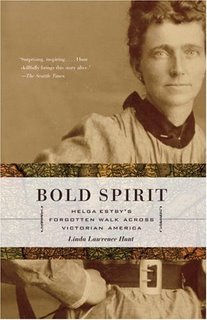
written by Linda Lawrence Hunt
My sweet mother-in-law sent me this book not long before I headed out to the Appalachian Trail for another hiking adventure. Perfect reading for a hike! It's about a woman who completes the monumental challenge of walking across America with her teenaged daughter from Spokane to New York City, unaided, in 1896. I was so fascinated by the premise of the book — epsecially in light of my own odyssey of completing the Appalachian Trail — that not only did I read it en route to the trailhead in North Carolina, I actually added it to my backpack so that I could continue reading while I was out in the wild. Now, that might not sound so astounding, but trust me — any object that is not absolutely necessary for survival (especially one that weighs 11.125 ounces, like this book does) has to be pretty captivating if I'm going to consider adding it to a backpack that's already frighteningly close to 35 pounds.
The story is of a Norwegian immigrant named Helga Estby, whose life appears to have been filled with hardship from the get-go. She emigrated from Norway to Manistee, Michigan with her parents (she was an only child) at age 11 and just four years later, found she was pregnant. The circumstances of her pregnancy are unknown. It appears she soon became party to a marriage arranged by her family. Her groom was an older Norwegian man who was likely not the father of her child. Together they endured a harrowing move across the country and several devastating events, including a fire and fears of debilitating diseases that devastated many prairie communities. They eventually settled in the Pacific Northwest, and life was very hard. In additon to Helga's firstborn, Clara, they had seven more children and endured the constant physical and financial struggles of a pioneer family. Helga survived a life-threatening "female illness" (no further details on her malady exist) that required dangerous corrective surgery. A wildly fluctuating economy made it impossible to sustain financial security. At the time that Helga began walking across the country, the family was in such financial straits that they were in danger of losing their farm and all that they owned.
Which is the biggest reason why Helga undertook the challenge of walking those thousands of miles. Apparently, some mysterious sponsor in New York offered to pay $10,000 to Helga if she was able to complete the journey according to an agreed-upon contract which stipulated a strict timeline and rules. That sum of money, in Helga's estimation, would help her and her husband unbury from their debt and preserve their farm and family.
Really cool elements:
- Just the idea of this woman and her daughter (Clara, age 18, accompanied Helga on her journey) taking on such an unthinkable challenge is so cool! Though the hiking I do on the Appalachian Trail certainly pales in comparison to what Helga and Clara endured, I love reading about seeminly ordinary women of previous generations who pushed back boundaries and took on things that no one thought they could handle. One particular quote near the end of the book says it all: "For women to walk unescorted in the wilderness...was simply incomprehensible..." (p. 248). Have I not heard those words myself?!
- I love how Helga's adventure is not just a story of a woman and her daughter doing something amazing; it's also a reflection of a bigger picture that colored the culture of the 1800s. Society as a whole — both women and men — was grappling with the ideas of women's worth, women's rights, and women's tenacity. People's reactions to Helga and her journey were very mixed. Some admired her. Many disdained her. She was doing something that women "weren't really supposed to do." (Sad to say, in some ways, times haven't changed that much! Any woman I know can easily point to countless examples of ways she is heavily influenced by what others deem is proper — or improper — for our gender.) The author does a great job of showing how this bold walk exemplified the emergence of a new attitude towards women's roles and abilities.
- Ladies, it will definitely give you a certain "girl-power" feeling to read this book, but the really cool thing is that it doesn't do so at the expense of men. I get so sick of how feminist literature often implies that recognizing women's worth requires that we simultaneously malign and scorn men. This book rightly allows the worth of women to stand on its own, with no need to trash the other gender.
Not-so-cool elements:
- The author is a scholar, and it shows. In many places the book reads like a research paper because, well, it is! This isn't a bad thing; it just makes for some boring passages that I think an artsy-er writer could've breathed a little more life into.
- You might become frustrated by the lack of detail on certain topics. For example, there's no firm information on the mysterious New York sponsor. Who was it? Was Helga hand-picked by this person, or was some kind of contest involved? What were Helga's fears, concerns, triumphs? Unfortunately, many, many details of the story have been lost. Helga's memoirs were destroyed by family members who disapproved of her adventure and took steps to silence her story. Sad.



